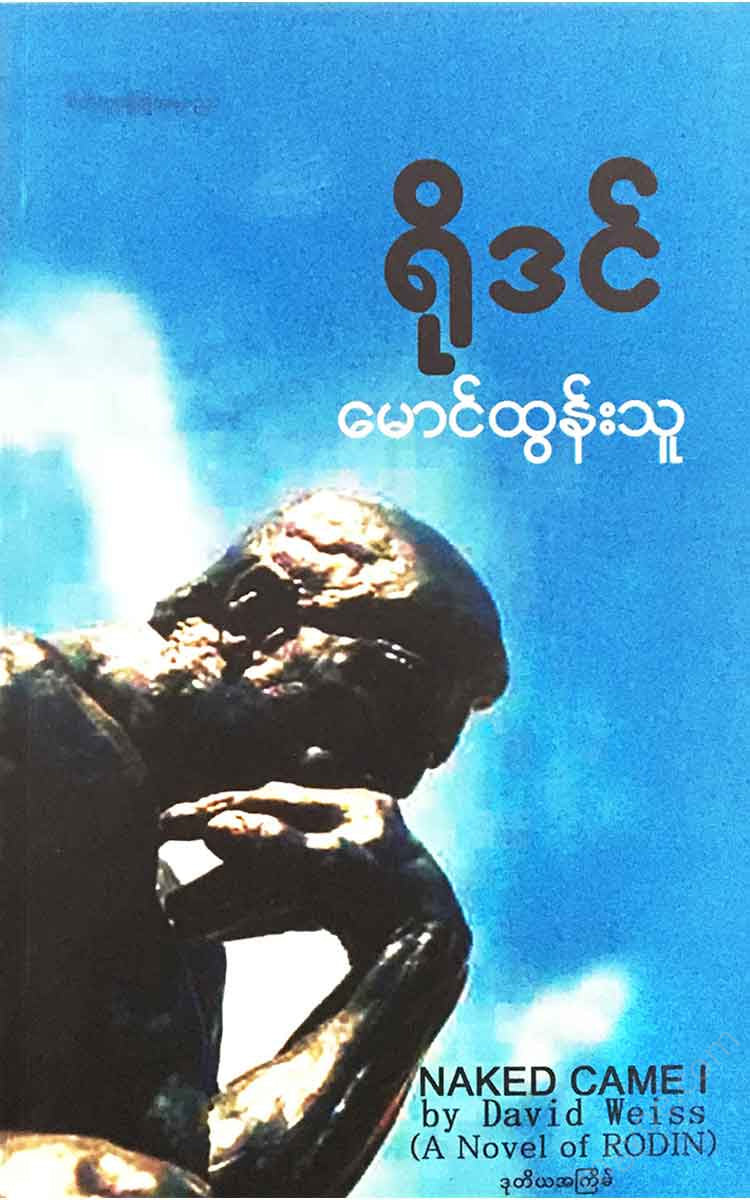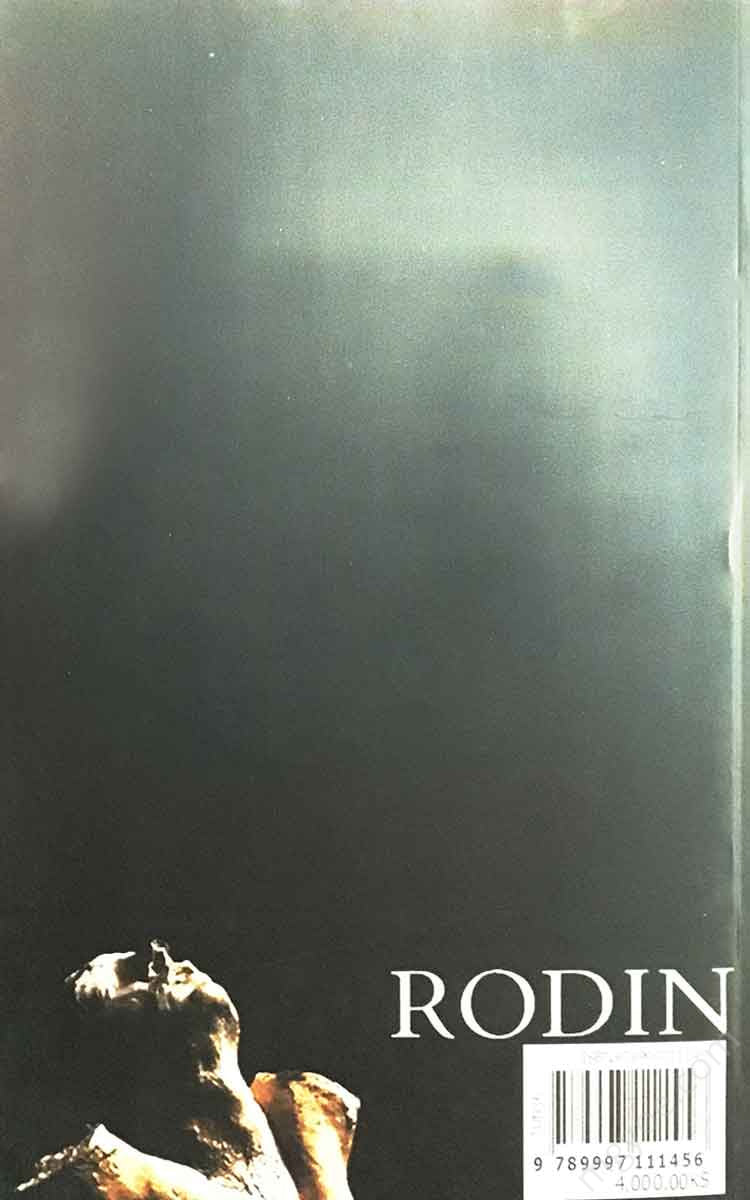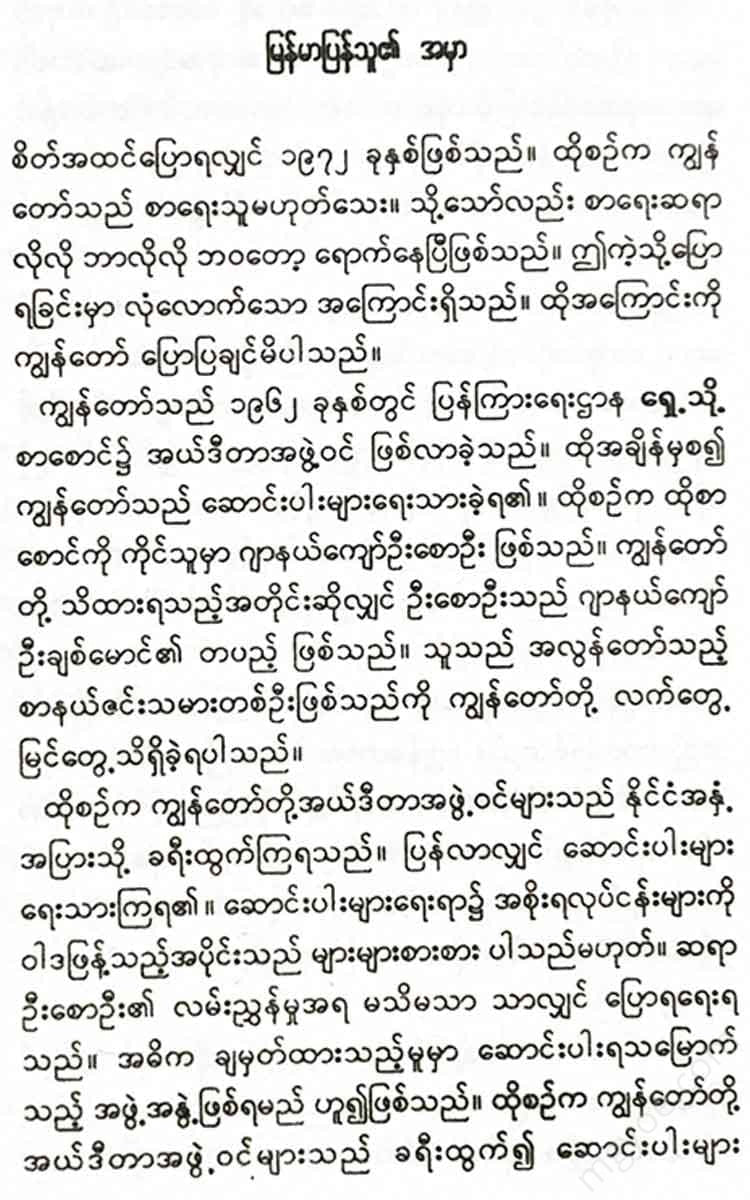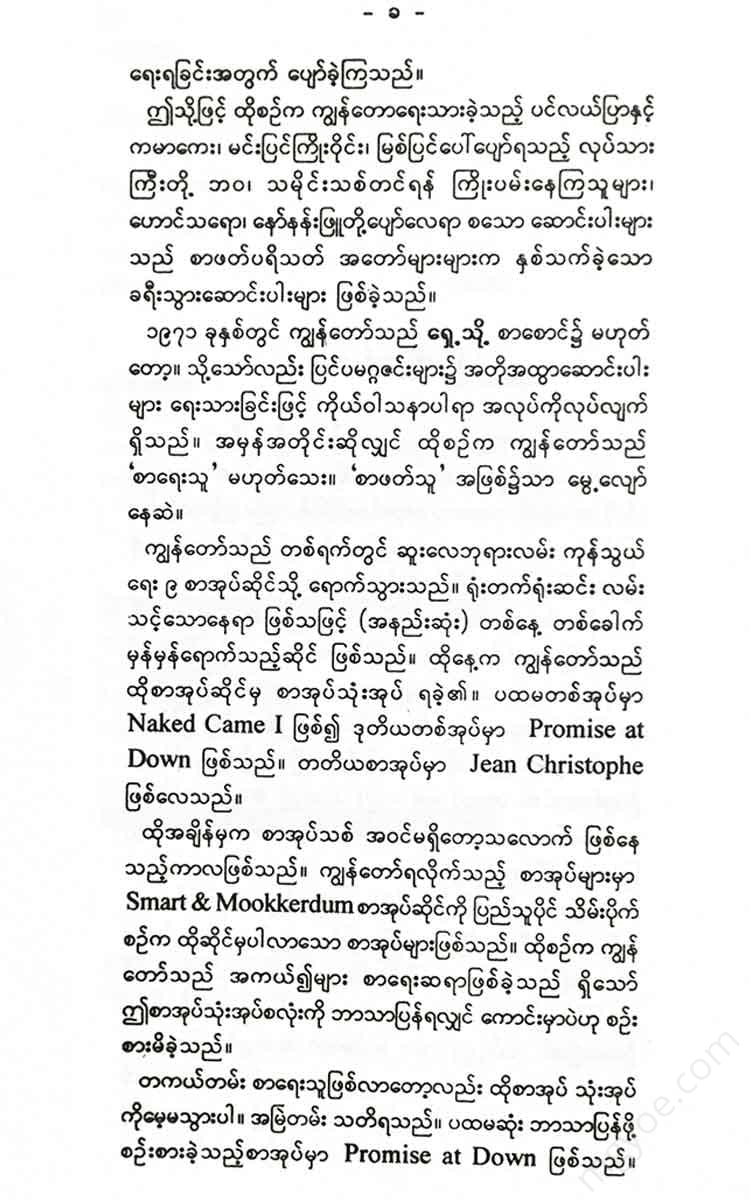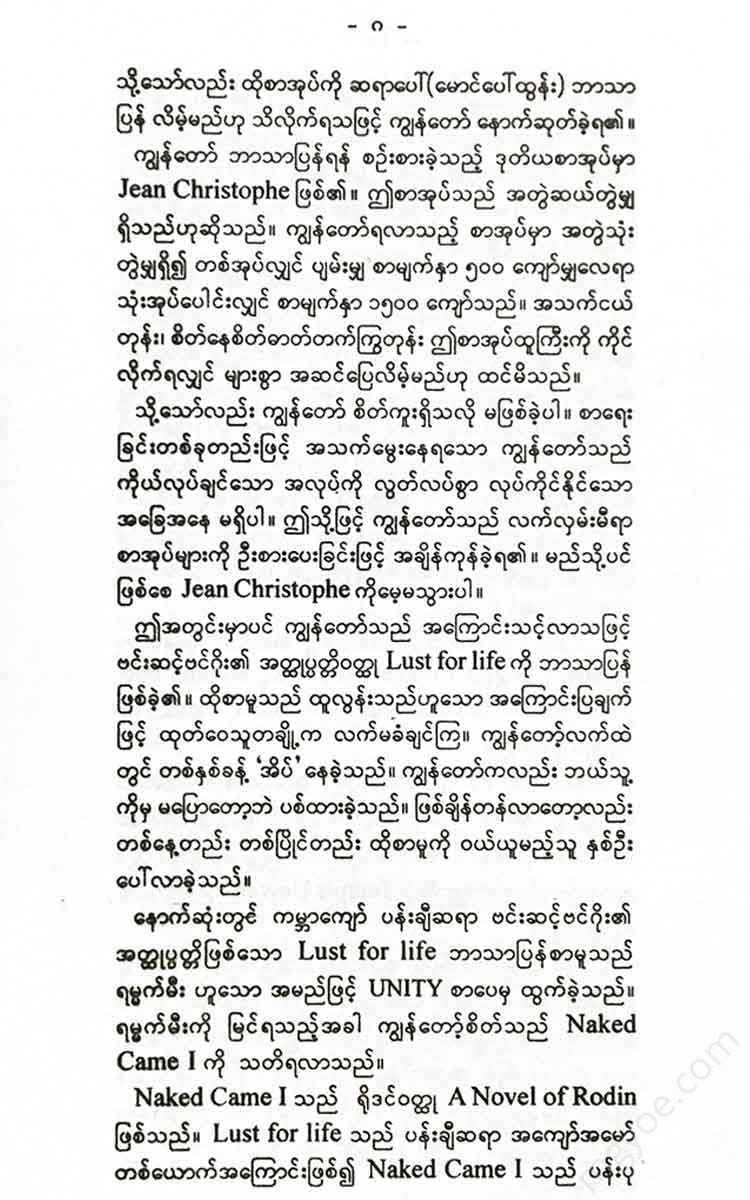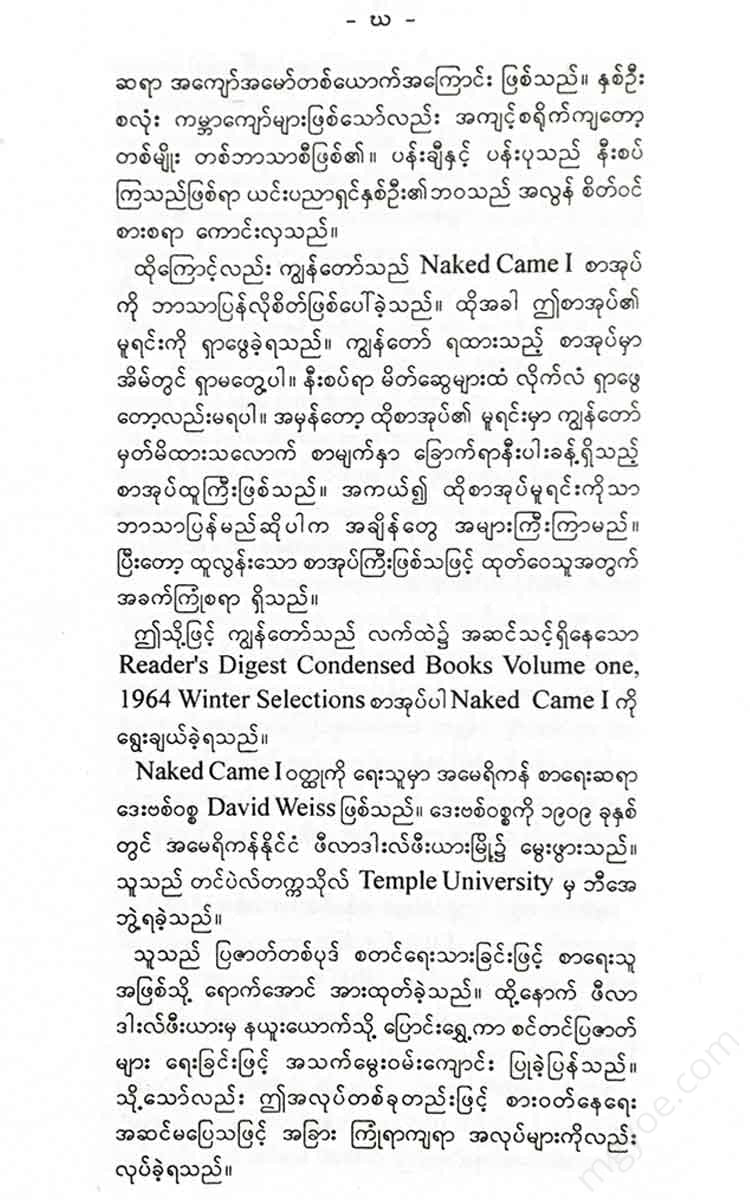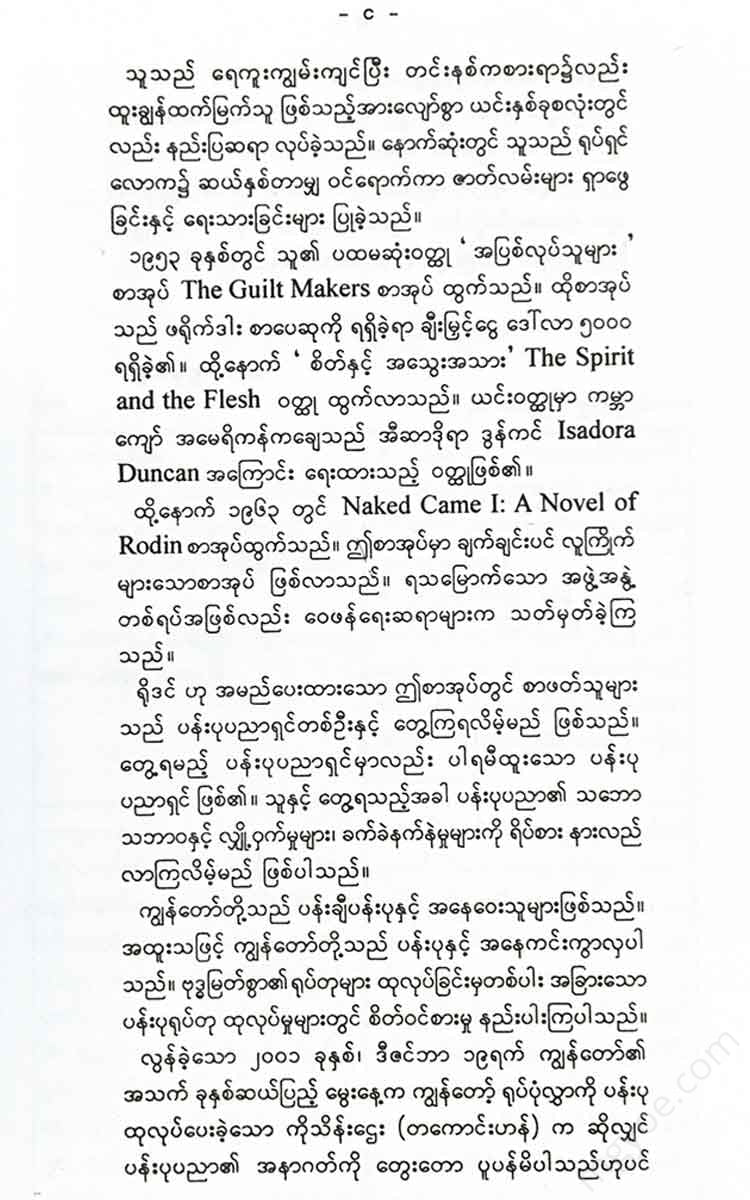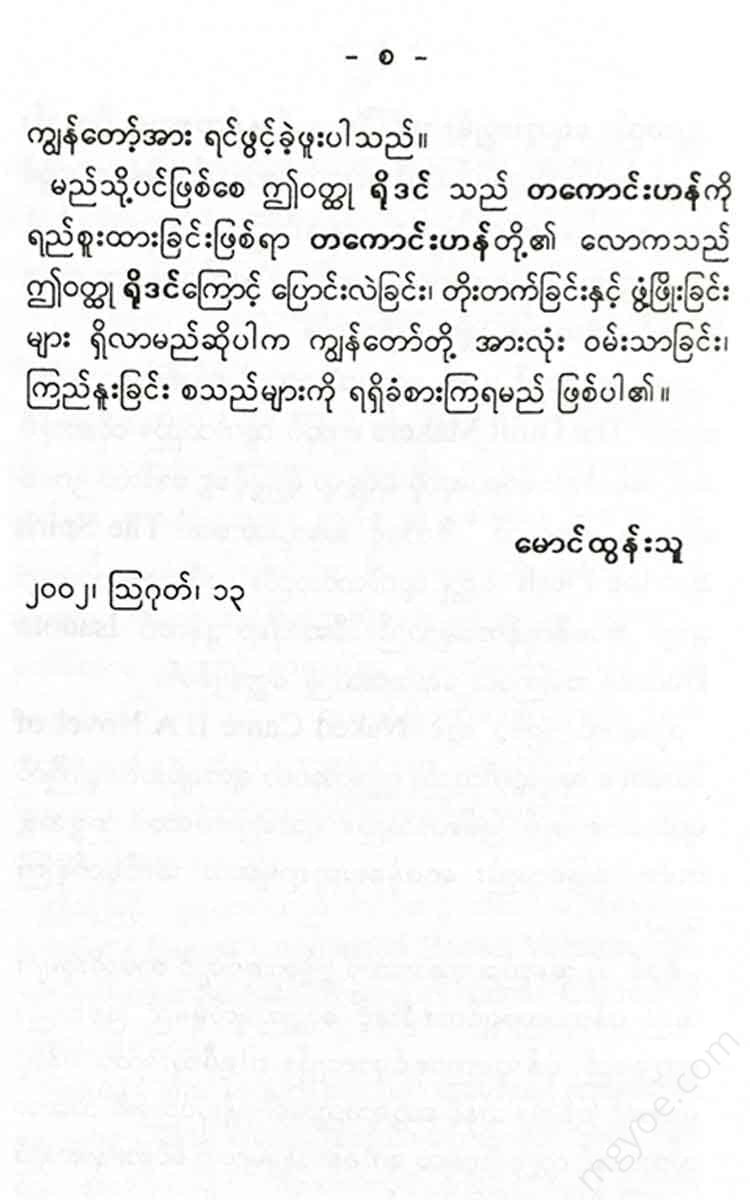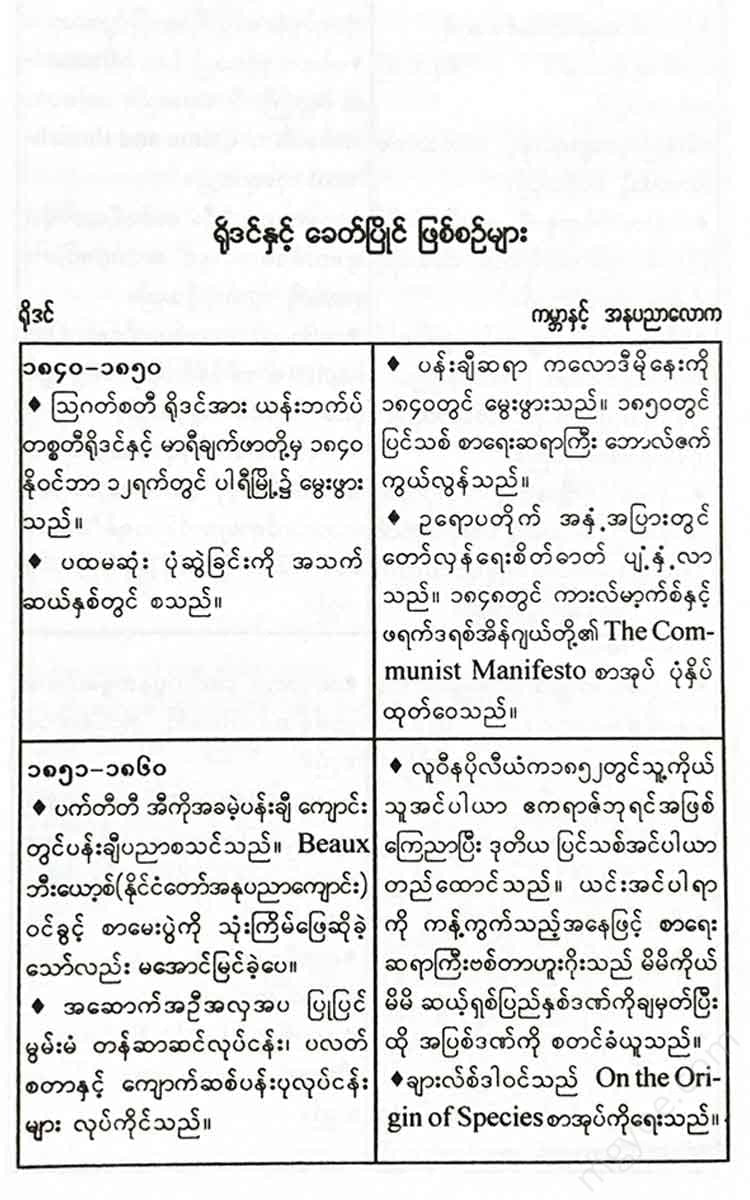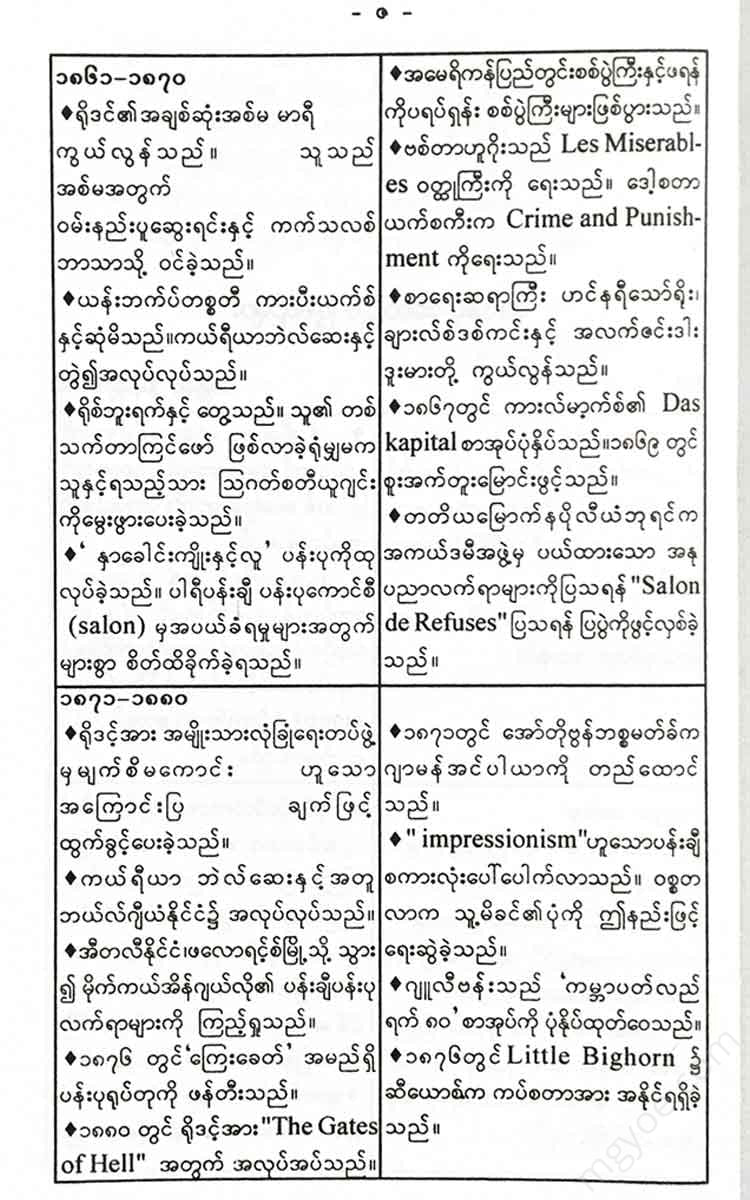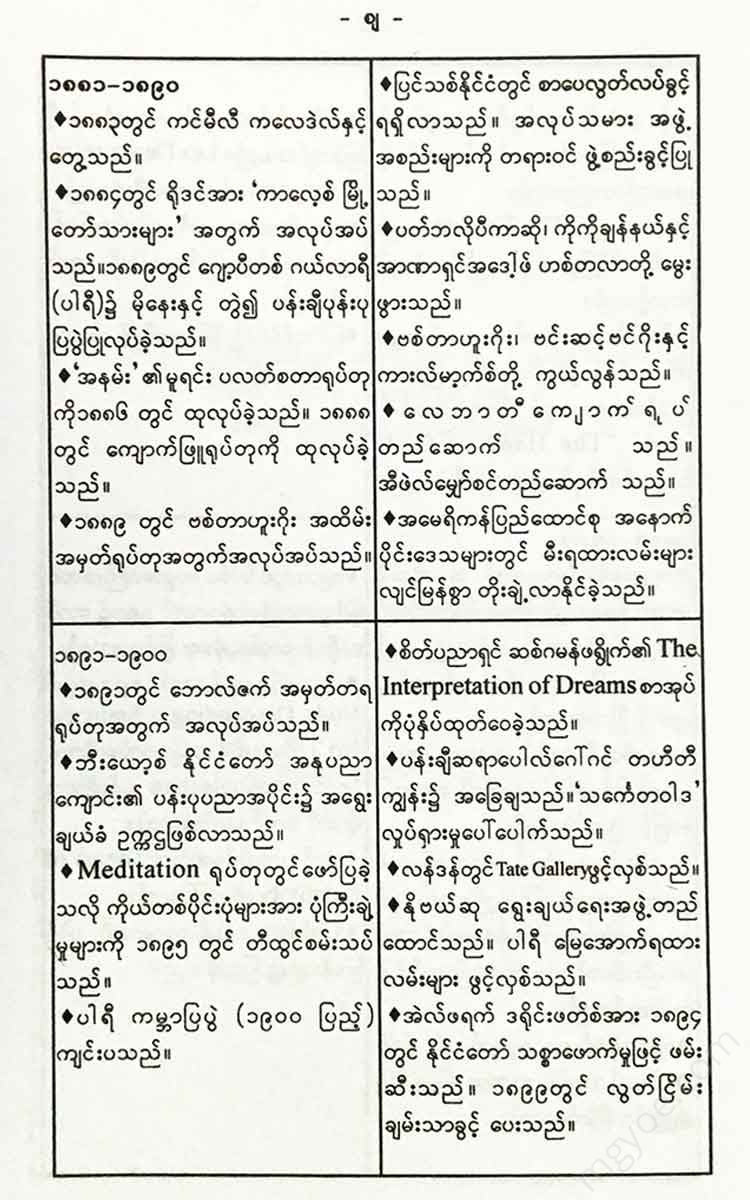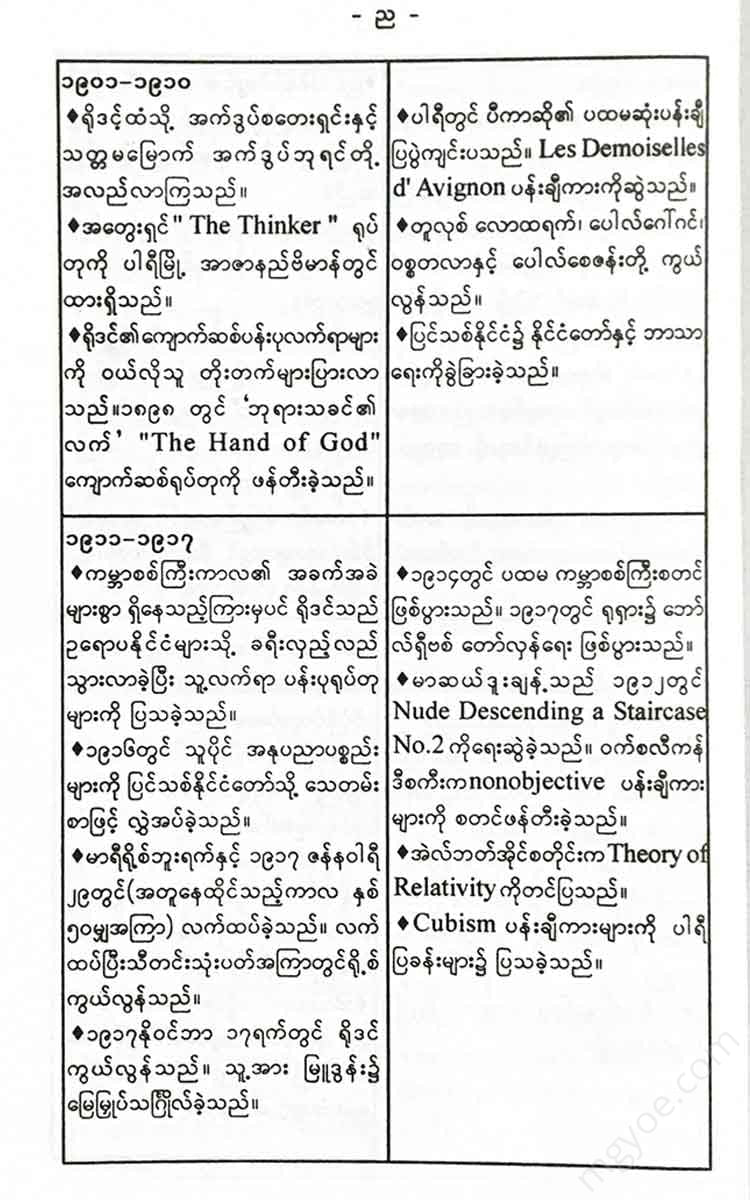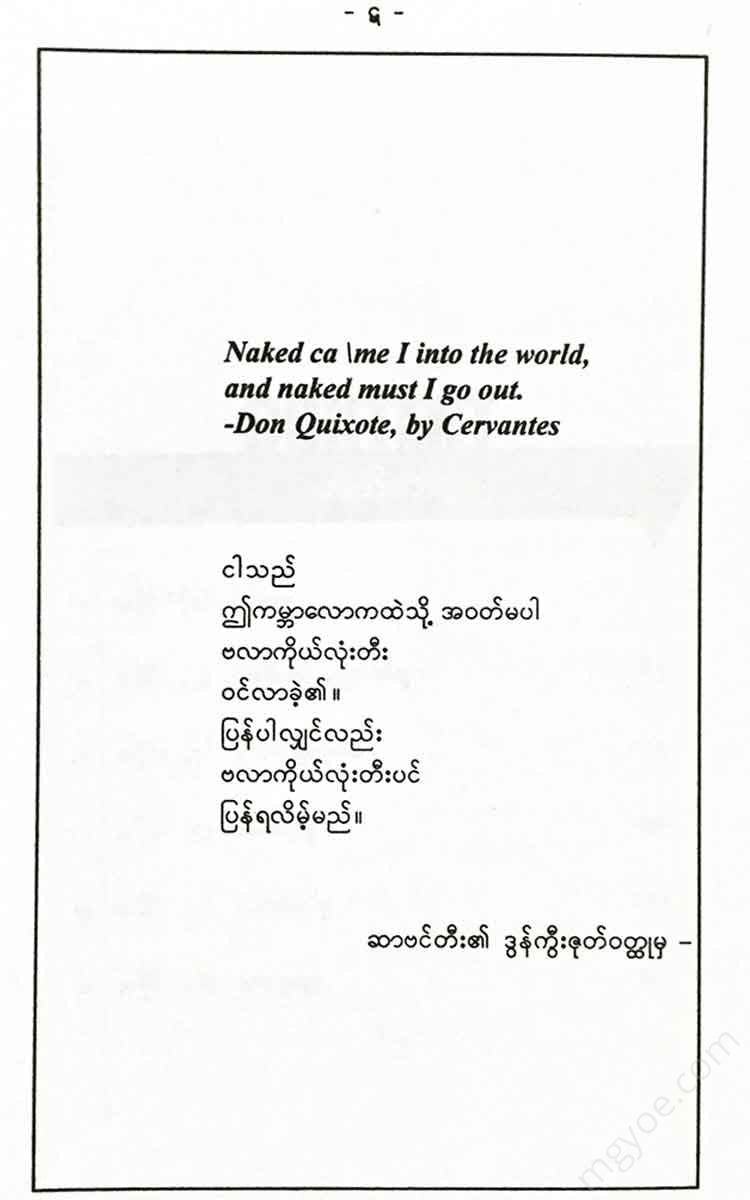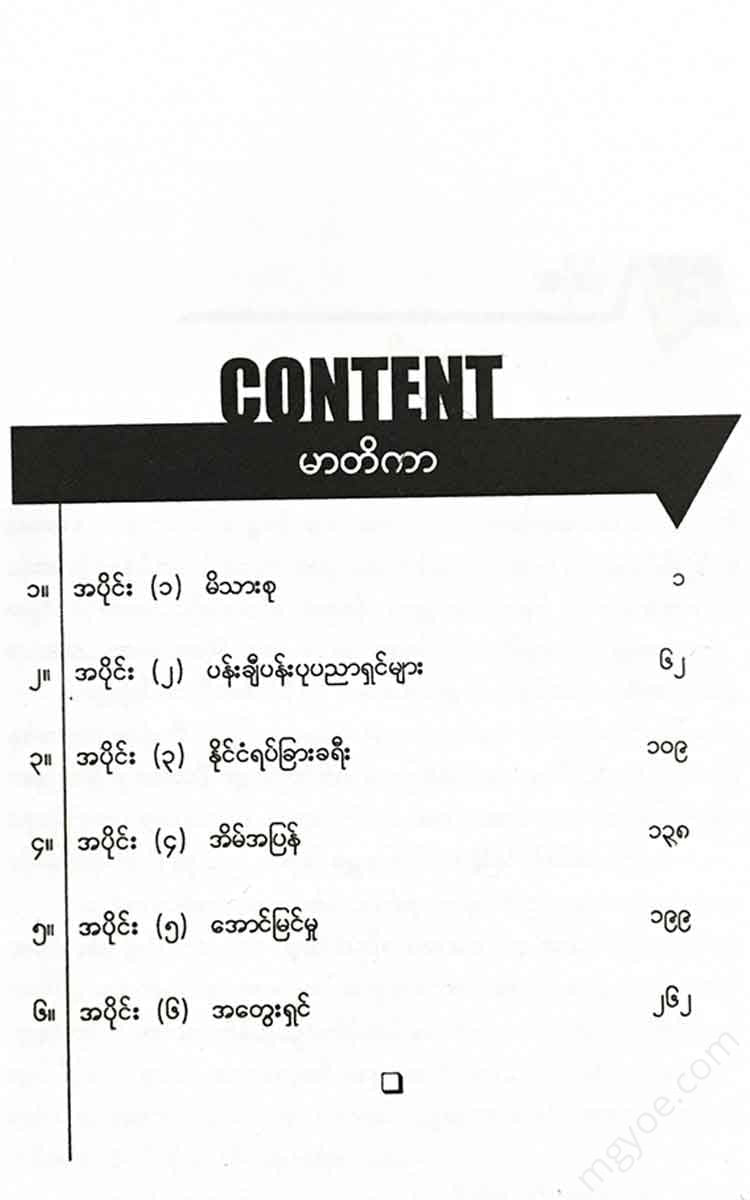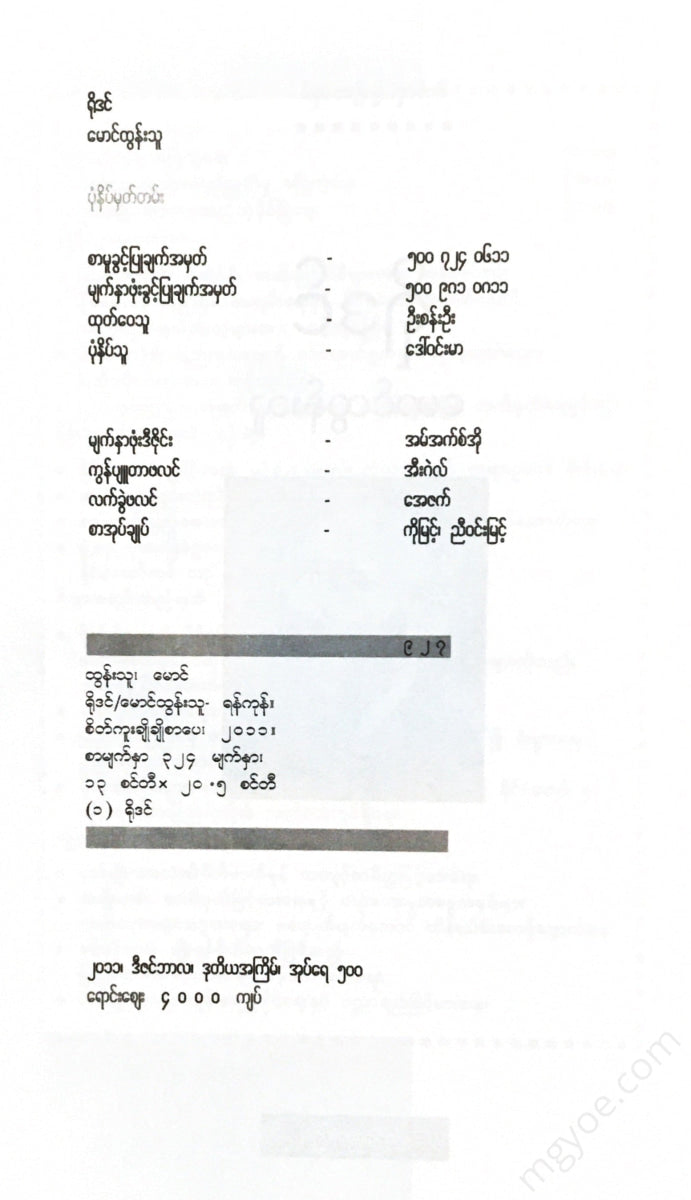စိတ်ကူးချိုချိုစာပေ
Maung Tun Thu - Rodin
Maung Tun Thu - Rodin
Couldn't load pickup availability
The child's father was a French farmer from Normandy. The farmer, named Jean-Baptiste Rodin, had not expected to become a father until he was thirty-eight years old. When he unexpectedly had a son, he was overjoyed beyond measure.
He had two daughters, Clotilde and Marie, and he did not care much for either of them. He had come from Normandy and had moved to Paris. He saw no prospect of becoming wealthy if he continued to live in Normandy. That was why he moved to Paris.
For him, having a son was the best thing that could happen. A son would be of great help to him when he was old. And wouldn't his son carry on his name? In their Norman dialect, the word "Rodin" means "red." His new son, like all his family, had red hair.
He wanted to register his son. But neither he nor his wife could write. His wife, Marie, was a peasant like him, from Lorraine. So he asked his wife's sister, Anne Thierry, to help him fill out the registration form. Thierry had worked as a maid, model, and housekeeper for the painter Droline, and had learned to read and write from the artist.
His father said, “We will call him François Auguste.” Then Aunt Thierry wrote on the application form: “Francois Auguste Rodin, 3, rue Abelette, Paris. Born November 12, 1840.”)
“It will cost every leu coin to hold the memorial service and the service,” said the father.
“The baby looks like it will be very healthy,” Aunt Thiri commented, looking at her nephew.
“All Rodins are healthy,” said the father-in-law with great energy. However, his appearance suggested a problem. He ran his hair through his sparsely furred hand and scratched his head. He was, in fact, a supporter of the Bourbon monarchy. However, the current King Louis Philippe was not a person who could guarantee his son’s future. He now lived in Paris, a city dominated by middle-class businessmen. And although he was a policeman by profession, he was originally a farmer.
The neighborhood he now lived in was barely above the slums. It was also a place where prostitutes were rampant. He could not afford to live in a neighborhood that was more complicated than this, a maze of medieval cobblestone streets. The Abeletti neighborhood where he lived was not far from the Souk and Notre Dame Cathedral, and was within walking distance.
This area is home to some of the most beautiful old churches, such as Saint Severin, Saint Genevieve, and Valdegraços. The Rodin family rented a room on the fifth floor of an old building, and had to climb a hundred and one steps to reach their room.
“I like the name Augustine,” said Aunt Thiri. “I gave it to my first son when he was born.”
She kissed the father, Rodin, on the cheek in praise.
"How pitiful," thought the father. He was as fond of Aunt Thiri Si as anyone else. Thiri Si was a beautiful woman and a cheerful person. However, all three of her sons were born in secret, without their fathers. This was a shameful matter, but Aunt Thiri Si showed no sign of shame.
He wanted his son, François Auguste, to be a religious man. He wanted him to be healthy and strong. He also wanted him to become a police officer. He also prayed that he would become what he wanted him to be.
In his experience, only the middle class, the so-called bourgeois, tend to become high-ranking police officers. Isn't this because people from that class are literate?
Why should his son, who was now born, be an illiterate person? He could not be an illiterate person like himself. In any case, even an illiterate person had become a policeman with a salary of eight hundred francs a year. So he firmly decided that he would give his son, François Auguste, a good education.
When Augustine was five years old, she became a student at the Jesuit school (Brinji religious school) near their home. Aunt Thiri Si gave her a set of drawing and colored pencils as a gift. Aunt Thiri took these items without asking permission from Drolyn.
The Rodin family now lived in a cleaner street than before. The house was much better. Their room was on the first floor. This afternoon, François Auguste was alone with his aunt Thierry, who had promised to look after him. Red-haired, short-haired, shy, shy, and blind, Auguste was very fond of black drawing capsules.
The capsules were capable of expressing different lines in addition to the lines. He could see them clearly. He wanted to draw Aunt Thiri's delicate figure. But he thought he should draw his father first. Shouldn't his father be the first priority in everything?
He found brown paper. The paper his mother had wrapped around the potatoes she had bought for dinner. He was sitting cross-legged at the kitchen table, frowning, and drawing a picture with his mind. The drawing pad revealed a thick line that resembled his father's lips. And... a grimace. Then he saw his father's body, his father's smelly trousers, his loose-fitting coat, his thick belt.
Aunt Thiri said, “Your drawing is good. Next time I will bring colored capsules.”
The next week his mother bought cabbage. He took the paper that the cabbage came in and drew on it. The fish was wrapped in newspaper, so he looked at the pictures in the newspaper and drew them. When his mother bought butter, cheese, and eggs, he was very happy. Because they were wrapped in blank white paper. Isn't it great for him to draw on blank white paper?
He drew a picture of his father who was excited. He drew a picture of his mother who was patient and humble. He also drew a picture of Aunt Thiri who was happy, a picture of his lovely sister Marie, and a picture of his beautiful sister Clotilde. He drew the pictures alone. Because he was afraid that his father would not like what he was drawing.
He often hears his mother's voice asking.
"Hey... Augustine, where did the wrapping paper go? There's nothing left to light a fire in."
Later, my mother started hiding all the papers she found.
One day, my mother came home with a shopping basket. Then she took off the white paper that had wrapped the cheese. My mother was busy with other things she had bought, and she didn't notice that the white paper had fallen from her hand onto the floor. She had her back to Auguste. When she turned around, Auguste had taken a drawing tablet and was lying on the floor. He drew a picture with his left hand on the white paper he had taken. At that moment, he heard the door open and close, and he saw his father standing in the room.
“Auguste... get off the couch,” his father said, tearing off the paper that was covered in stuff and throwing it into the oven. He took off his shoes, sighed, and sat down at the table. Auguste flattened the paper with his palm and began to draw a picture of one side of the shoe. His father was eating.
Augustine only realized what his son was doing when he tripped over the side of the table leg, spilling liquid from his father's soup bowl.
“Give me that piece of paper.”
"His father demanded. In the past, Augustine had never disobeyed his father. This time, he shook his head.
"Mother... please bring me some baby food."
"He ordered." The mother reluctantly took the parchment and placed it in her husband's hand. The father ordered, "Put the paper in the oven."
Augustine put the papers he had drawn on into the oven. His face showed a look of hurt at having to do a job he didn't want to do.
“Put those drawings in the oven, hurry up.”
"Dad, don't do it."
"Do it now"
The drawing capsules went into the oven.
"Auguste, go to bed."
"Aren't you going to eat dinner?"
My mother said.
"This is Yang.... If this happens, he will be hurt."
"Put him to bed"
"My father added.
The father shouted at the boy, whose face was pale with fear and terror.
"You don't have to do anything with the wrapping paper, you know. If I see you drawing any more pictures in this house, I'll have to beat you. I'll have to enroll you in school before you become a lunatic."
Augustine had to go to bed. Later, her mother sent her a bowl of soup. But she couldn't eat. She couldn't sleep. Anyway, whenever her father wasn't home, Augustine would take the charcoal from the stove and draw portraits on the walls in the hallway outside.
The monastery was located on the corner of St. Michael's Road. On his first day of school, he went there with great enthusiasm. However, he was very disappointed by the very old building and the strict rules and regulations of the medieval Christian monks.
The main subject of the curriculum was religion. It was not easy for Augustine to memorize the Christian religious questions and answers. It was a very difficult and tiring task for him. At school, he was also taught arithmetic, which he did not understand at all. The language he hated the most was Latin. In addition, he was taught reading, writing, geography, history, and grammar.
He was poor in all subjects. The main reason was his poor eyesight. Art was something that was forbidden. One day, Augustus was drawing a map of the Holy Roman Empire. A ruler fell heavily on his fingers as he was drawing. For a week, his hand could not hold a pencil. Then, when he was caught drawing again, he was flogged. However, Rodin, who was too stubborn, often painted caricatures of the inhuman, stern faces of the monks, and their unholy joys.
The only event that greatly affected Rodin at that time was the Revolution of 1848, which overthrew King Louis-Philippe. Here, suddenly, something unexpected occurred. It was none other than the disappearance of the school. Here
They understood that revolution was not a picnic. When the workers of Paris took up arms, rebelled against the government, and demanded the establishment of a republic, even children like Rodin began to understand the nature of revolution.
The Rodin family's home area became the center of the fighting. The rebels built barricades and trenches along the main St. Michael's Road.
The workers who had been fired were holding guns and knives and shouting slogans of freedom.
The French national anthem, "La Marseillaise," is sung by both the government and the rebels. Auguste Rodin's father is unable to go to work. No one is allowed to leave the house because of an order. The family survives on one potato per day during four days of fierce fighting.
Rodin's father was a supporter of the monarchy. However, his faith was shattered when he saw the brutal killing of workers. During this period, he was greatly relieved when Louis Napoleon Bonaparte was elected President of France. Schools reopened. Auguste's eyesight worsened. He became the weakest and worst student in school.
The Rodin family had to move again. This time to a better house on the Rue Saint-Jacques. Each room had two windows, each with a single pane of glass. However, people often threw garbage on the street, so the family had to constantly clean up the garbage to prevent the spread of the plague.
The house was always cold. All things considered, poverty pervaded the whole house. However, his father's income was not small at this time. It was about twelve hundred francs a year. Outside their house was a statue of the Magi. Rodin often copied the statue. However, his father would not only tear the paper out of his hand, but also shout angrily, "Auguste, you are very difficult to talk to. You are not doing well at school either. I don't know what to do with you."
Nine-year-old Rodin tries to obey his father's orders. However, the sketches he draws are his only escape from this world. He starts skipping school, and one day the school writes a letter to his father complaining about this.
That afternoon Auguste went to Notre Dame Cathedral. He was greatly impressed by the magnificent beauty of the cathedral. The spires at the top of the cathedral, the large pillars supporting the walls from the outside, and the large windows on the west facade, flanked by towers, were all very remarkable to him. When he returned home, he tried to explain these things to his father. His father spat at him and cursed him.
"I didn't give birth to a son, you're a fool," he muttered. Then he beat Augustine with a belt.















